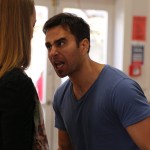 It’s true that often-times we feel the obligation to emote very strongly – and we must rise to the occasion if the script’s big print tells us something like: ‘Bill bursts into tears.’ But anything that over-stimulates the actor’s inner censor is bad news. And apart from this there is the fact that when an actor is enjoying an emotion through a scene they may feel great but the performance may well be rubbish. Feeling something is no guarantee of quality of result. Which is why we need directors – they get us back on track.
It’s true that often-times we feel the obligation to emote very strongly – and we must rise to the occasion if the script’s big print tells us something like: ‘Bill bursts into tears.’ But anything that over-stimulates the actor’s inner censor is bad news. And apart from this there is the fact that when an actor is enjoying an emotion through a scene they may feel great but the performance may well be rubbish. Feeling something is no guarantee of quality of result. Which is why we need directors – they get us back on track.
Even so, through years of correction, some actors will still persist in putting feeling first in their acting. It’s a tough trap to crawl out of. I’ll never forget Cecily Berry’s tirade to some hapless actor in a master-class guilty of this (in her view) cardinal sin. Something similar pops up in one of her books and it’s worth quoting in full: “You must get rid of all the rubbish! By that I mean you have to constantly pare away all unnecessary coloring and tension and the paraphernalia which you feel you need to convince an audience and which, in fact, gets in the way of direct communication. I am sure that one of the actor’s greatest concerns is the fear of not feeling enough and, therefore, of not being interesting enough. The greater the emotion in the part the more he tries to convince the audience of his feeling and so ceases to be specific. You know that this often occurs but it is difficult to trust yourself. You must believe you have a right to be there.”
In a class with American Broadway director Bob Benedetti he once demonstrated to us his take on the place of emotion. At the end of a scene he asked the actors – how did that feel? Great, said the actors. That, Bob pronounced, is the place of emotion in acting.
Sometimes I think you can take this stiff upper lip attitude to emotion a bit too far, as if feeling anything in acting might be some kind of failure. In fact emotion, real human ever changing emotion, is at the heart of what we do. The words in any scene are just our starting point for investigation, clues as to what the writer’s intent might be – a springboard to discovering the real life underneath the words, what the characters are really thinking and feeling – which is often at variance to what they are actually saying. This is what interests any viewer: not what we are saying, but what is REALLY going on. Yet the emotion has to happen as a result of the playing. Emotion needs to be put in its proper place, the place it holds in real life: as a by-product of the playing, the result of what we do – not the thing to go for in the playing itself.
The buzz that we can find in our acting is, like Benedetti says, not emotion as such, but feeling great because we are living in the moment. In performance, when we act well, we are fully alive. We are sensorially more activated than at any other time. Our left and right brains, our conscious and creative sides, are working together. As you play you are discovering insights and seeing moments unveil themselves in ways miraculously in line with the requirements of the scene – all the while meeting the necessary technical requirements, such as hitting your mark or staying in your light – all simultaneously. Actors that get hooked on that other fix – emotion – may not actually be fulfilling their (usually quite simple) obligations to the scene. They are certainly missing out on a better creative buzz than they could have imagined.